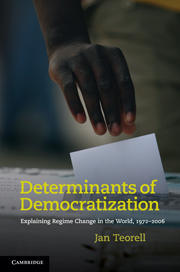Book contents
- Frontmatter
- Contents
- List of tables
- List of figures
- Acknowledgments
- Introduction
- 1 Explaining democratization
- 2 The shadow of the past: social determinants
- 3 The power of prosperity: economic determinants
- 4 The impetus from abroad: international determinants
- 5 The force from below: popular mobilization
- 6 Exogenous shocks and authoritarian regime types: institutional contingency
- 7 Conclusions
- Appendix A Data and variable definitions
- Appendix B Statistical model
- Appendix C Robustness tests
- Appendix D The pathway criterion
- References
- Index
1 - Explaining democratization
Published online by Cambridge University Press: 05 June 2012
- Frontmatter
- Contents
- List of tables
- List of figures
- Acknowledgments
- Introduction
- 1 Explaining democratization
- 2 The shadow of the past: social determinants
- 3 The power of prosperity: economic determinants
- 4 The impetus from abroad: international determinants
- 5 The force from below: popular mobilization
- 6 Exogenous shocks and authoritarian regime types: institutional contingency
- 7 Conclusions
- Appendix A Data and variable definitions
- Appendix B Statistical model
- Appendix C Robustness tests
- Appendix D The pathway criterion
- References
- Index
Summary
Ideally, an explanatory theory of democratization should fulfill several criteria. It should be sufficiently general to encompass the regularities in patterns of regime change across both time and space, but without sacrificing concreteness and the ability to account for complex causal mechanisms at work in singular instances. It should transcend the structure and agency divide by specifying how and when structural constraints affect the desires and beliefs of social actors, while at the same time providing some logic for understanding why these actors make decisions the way they do, and how the interaction of these decisions produces an outcome in terms of regime change. This ideal theory should be capable of explaining both short-term and long-term dynamics in regime trajectories over time, and both why autocracies turn into democracies and why some democracies become autocracies again. It should be probabilistic by nature, and thus leave the possibility of perfectly determined outcomes as a limiting case under extreme circumstances rather than as an inherent quality of the theory itself. It should be integrated and internally consistent: if consisting of more than one explanatory factor (which seems likely), these should not be mutually contradictory. Finally, this theory should be empirically corroborated, that is, it should be supported by as broad a body of empirical evidence as possible.
Perhaps not very surprisingly, all theories of democratization to date fall short of these standards. Social scientists have employed various theoretical and methodological approaches in order to explain democratization. The territory has been charted by sociologists, political scientists and economists alike, drawing on in-depth case study knowledge, comparative-historical analysis and statistics. Most work has been based on informal theory, largely developed inductively, but more recently formal, game-theoretic and deductive approaches have come to the fore. Beneath these conspicuous differences, however, one may discern three intellectual traditions that have forged the landscape of democratization studies. These are the structural and strategic approaches and the social forces tradition. To this we must now also add the more recent economic approach to explaining democratization. In this chapter I shall review these four approaches in turn, assessing their respective theoretical strengths and weaknesses. Equipped with these insights, I conclude by defending the particular approach to explaining democratization that will be adopted in this book.
- Type
- Chapter
- Information
- Determinants of DemocratizationExplaining Regime Change in the World, 1972–2006, pp. 16 - 38Publisher: Cambridge University PressPrint publication year: 2010



